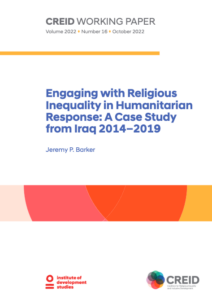
Title: Engaging with Religious Inequality in Humanitarian Response: A Case Study from Iraq 2014–2019
Author: Jeremy P. Barker, Director of RFI’s Middle East Action Team
About: In this paper, Jeremy Barker explores how religious diversity dynamics shaped humanitarian assistance efforts in the context of large-scale displacement due to conflict in Iraq, and what actions were taken to engage with religious inequalities through programmhttps://religiousfreedominstitute.org/wp-content/uploads/2023/03/Engaging-With-Religious-Inequality-in-Humanitarian-Response.pdfatic responses. It is based on fieldwork in Iraq, interviews with local and international humanitarian practitioners, and document analysis. While Barker examines a range of methodological and theoretical matters, he also addresses a number of practical issues in the areas of policy and program implementation.
The case of humanitarian assistance to Iraq from 2014 to 2019 highlights that significant work remains to be done to mainstream the awareness and response to religious diversity dynamics within humanitarian response programming. The population’s make-up and the particular shape of the crisis in Iraq brought these religious diversity dynamics to the forefront. However, despite ISIS intentionally targeting religious communities with violence, humanitarian assistance programmes often failed to consider the religious diversity dynamics in areas where they were planning to deliver aid.
Publication Date: October 2022
Suggested Citation: Barker, Jeremy. “Engaging With Religious Inequality in Humanitarian Response: A Case Study from Iraq 2014–2019.” CREID Working Paper. Coalition for Religious Equality and Inclusive Development (CREID). Brighton, UK: Institute of Development Studies, October 2022. https://doi.org/10.19088/CREID.2022.012.
THE RFI BLOG

Is Egypt’s Government Trying To Take Over Christianity’s Most Important Monastery?

Does Southeast Asia Lead the World in Human Flourishing?

RFI Leads Training Session on Religious Freedom Law and Policy for U.S. Army War College

Oral Argument in Charter School Case Highlights Unconstitutional Motives Behind OK Attorney General’s Establishment Clause Claim

Largest Longitudinal Study of Human Flourishing Ever Shows Religion’s Importance
CORNERSTONE FORUM

Reaffirming Religious Freedom: Bridging U.S. Advocacy and Iraq’s Constitutional Framework

Political Polarization, Same-Sex Marriage and Religious Liberty

Bridging the Gap Between International Efforts and Local Realities: Advancing Religious Freedom in the MENA Region

Challenges to Religious Freedom in Iraq and the Critical Need for Action

